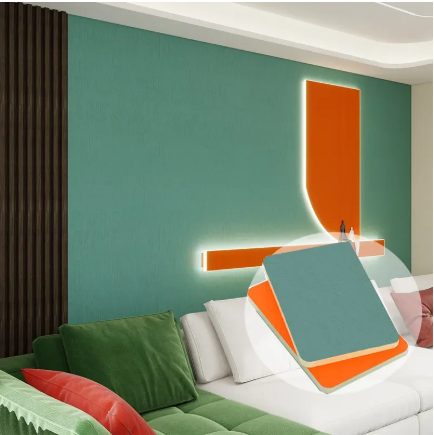Best Materials for Grille Wall Panels: A Buyer's Guide
Transform Your Space with Modern Architectural Elements
The evolving landscape of interior design has brought grille wall panels to the forefront of architectural innovation. These versatile decorative elements have revolutionized how we approach both residential and commercial spaces, offering a perfect blend of functionality and aesthetic appeal. As more designers and homeowners discover the transformative power of grille wall panels, understanding the various material options becomes crucial for making informed decisions.
The choice of material for your grille wall panel significantly impacts not only its visual appeal but also its durability, maintenance requirements, and overall performance. From traditional wood to cutting-edge composites, each material brings its unique characteristics to the table, allowing you to create stunning architectural statements that perfectly align with your design vision.
Premium Material Options for Lasting Impact
Aluminum: The Modern Marvel
Aluminum has emerged as a leading choice for grille wall panel applications, offering an exceptional combination of strength and style. Its lightweight nature makes installation straightforward, while its inherent resistance to corrosion ensures long-term durability. Modern aluminum panels come in various finishes, from powder-coated colors to anodized textures, providing unlimited design possibilities.
The versatility of aluminum allows manufacturers to create intricate patterns and designs that would be challenging with other materials. Additionally, aluminum grille wall panels require minimal maintenance, making them ideal for both interior and exterior applications. Their fire-resistant properties and ability to withstand extreme weather conditions further enhance their appeal for commercial installations.
Wood: Traditional Elegance Reimagined
Natural wood grille wall panels bring warmth and sophistication to any space. The organic texture and grain patterns create a unique aesthetic that cannot be replicated by synthetic materials. High-quality hardwoods like oak, maple, and walnut offer excellent durability while providing a timeless appeal that ages beautifully.
Modern manufacturing techniques have addressed traditional wood's susceptibility to moisture and temperature fluctuations. Treatment processes and protective finishes ensure that wooden grille wall panels maintain their integrity and appearance over time. The natural insulating properties of wood also contribute to improved acoustic performance, making it an excellent choice for theaters and music rooms.

Innovative Materials for Contemporary Designs
PVC and Composites: Future-Forward Solutions
The advancement in polymer technology has introduced high-performance PVC and composite materials to the grille wall panel market. These materials offer exceptional durability and moisture resistance while maintaining a sophisticated appearance. Their lightweight nature simplifies installation, and their resistance to warping makes them ideal for areas with varying environmental conditions.
Composite grille wall panels combine the best attributes of multiple materials, offering enhanced strength and stability. These panels can be engineered to mimic the appearance of natural materials while providing superior performance characteristics. The ability to incorporate recycled content also makes them an environmentally conscious choice for sustainable building projects.
Metal Alloys: Strength Meets Style
Specialized metal alloys have revolutionized the possibilities for grille wall panel design. These materials offer unprecedented strength-to-weight ratios and can be formed into complex geometric patterns that define modern architectural aesthetics. The durability of metal alloys ensures that panels maintain their appearance even in high-traffic areas.
Advanced finishing techniques allow metal alloy panels to achieve unique visual effects, from brushed surfaces to metallic sheens. Their resistance to UV radiation and environmental factors makes them particularly suitable for exterior applications where maintaining appearance is crucial.
Performance Considerations and Applications
Environmental Impact and Sustainability
The growing focus on sustainable building practices has influenced the development of eco-friendly grille wall panel materials. Manufacturers now offer panels made from recycled content and renewable resources, helping projects achieve green building certifications. The longevity of modern materials also contributes to sustainability by reducing the need for replacement and maintenance.
Energy efficiency considerations play a vital role in material selection. Some grille wall panels can contribute to better thermal performance and natural ventilation, reducing the building's overall energy consumption. The ability to incorporate these panels into sustainable design strategies makes them increasingly valuable in contemporary architecture.
Installation and Maintenance Requirements
Different materials require varying levels of expertise for installation and ongoing maintenance. Modern grille wall panels often feature innovative mounting systems that simplify installation while ensuring secure attachment. Understanding the maintenance requirements of each material type helps in making informed decisions that align with long-term facility management plans.
The development of modular panel systems has made customization and replacement more straightforward than ever before. This flexibility allows for easy updates to design schemes and efficient repairs when needed, reducing lifetime maintenance costs and extending the investment's value.
Frequently Asked Questions
What is the most durable material for outdoor grille wall panels?
For outdoor applications, aluminum and specialized metal alloys typically offer the best durability. These materials resist weather damage, corrosion, and UV radiation while maintaining their structural integrity and appearance over time. They require minimal maintenance and can withstand extreme temperature variations.
How do I choose the right material for my specific application?
Consider factors such as the installation environment (indoor/outdoor), budget constraints, maintenance capabilities, and desired aesthetic effect. Also evaluate the space's specific requirements for acoustics, fire resistance, and structural support. Consulting with design professionals can help match these requirements with the most suitable material options.
Are sustainable options available for grille wall panels?
Yes, many manufacturers now offer environmentally friendly options, including panels made from recycled materials, sustainably harvested wood, and eco-friendly composites. These materials often come with certifications that can contribute to green building ratings while maintaining high performance standards.
What maintenance is required for different grille wall panel materials?
Maintenance requirements vary significantly by material. Aluminum and PVC typically need only occasional cleaning, while wood may require periodic refinishing to maintain its appearance. Metal alloys and composites generally fall somewhere in between, requiring minimal but regular maintenance to preserve their optimal condition.

